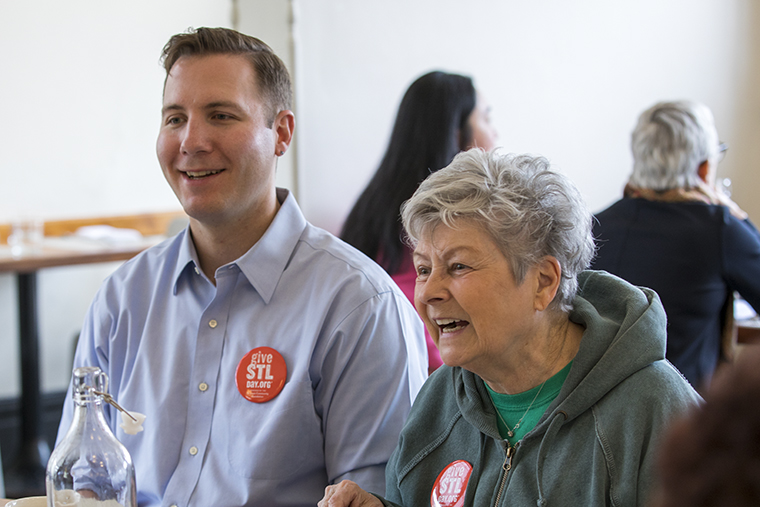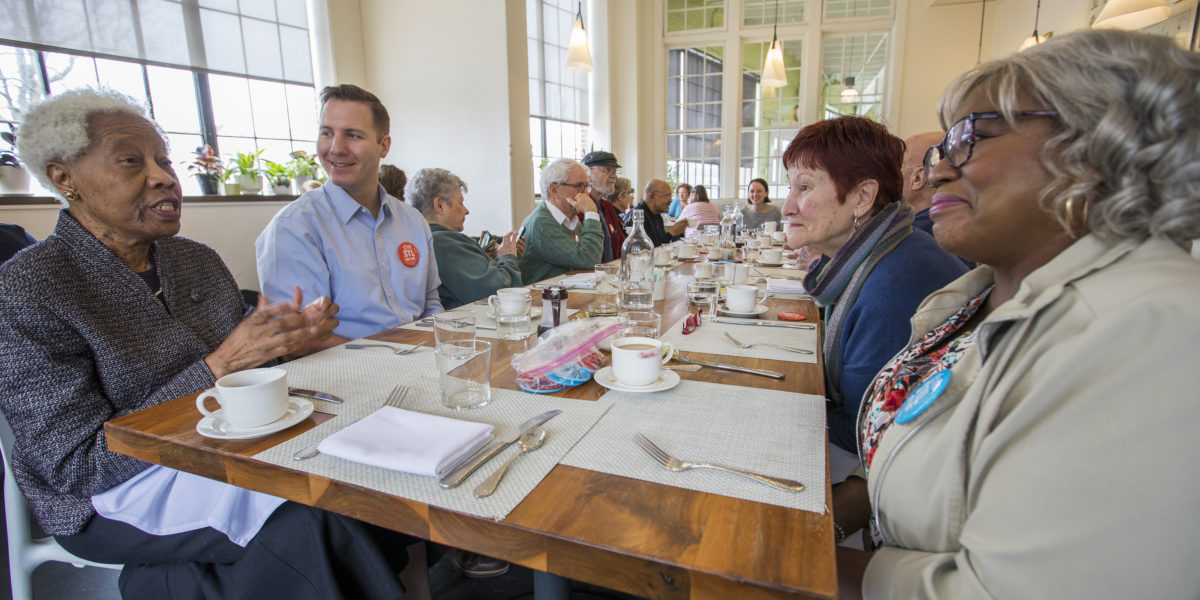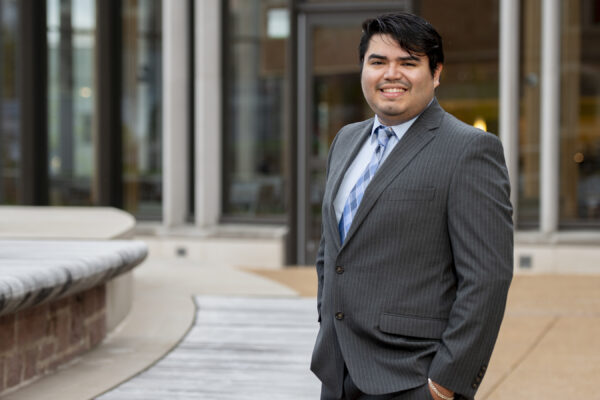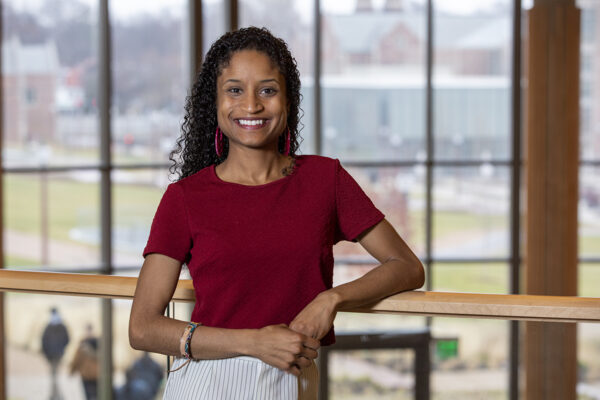Cal Halvorsen has a unique skill. It’s one that has allowed him to flourish in the nonprofit and research world and has enabled him to earn his PhD in social work from the Brown School at Washington University in St. Louis.
It’s a skill that not everyone has, though Halvorsen isn’t sure why; it just comes naturally to him. Looking back, it likely first surfaced in elementary school, when he opted to spend time with his grandmother at a nearby retirement home, playing piano and distributing hard candies to the “ladies,” as his grandmother often called the older, mostly female residents.
The skill, which has taken Halvorsen from Iowa to Washington, D.C., to China, Germany, Australia and beyond, is this: Seeing older adults as … wait for it … regular people.
“I just enjoy older adults,” he said. “I don’t look at them as any different than me, just older versions of me and my friends. Some people talk down to them as though they’re children. That’s not how you should talk to people.”
At 34, Halvorsen has parlayed this skill into a successful career. In June, he will move to Boston College and continue to study the relationship between work and aging. “I hope that my work will enable more people in, and approaching, later life to have more options,” he said, noting that could mean starting a business, volunteering, or just kicking back and relaxing.
This upcoming Commencement will mark the end of a chapter that began in Iowa City, Ia., with aspirations to start a skincare and makeup conglomerate.
“I was dead serious,” he said earlier this spring, one week away from defending his dissertation. “I worked for Clinique in college and I absolutely loved it,” he said. But by the end of his undergraduate studies at the University of Iowa, Halvorsen decided that sales wasn’t for him. Instead, he would study social work, with an emphasis on child welfare.
“All of my admissions essays were about the child welfare system,” Halvorsen said. “That’s how I was first accepted to the Brown School in August 2006 in the master of social work program.”
Knowing Halvorsen’s future — working in the field of gerontology, advocating for older adults — his beginnings in child welfare might be a surprise. But looking at his past, a career in childhood advocacy made perfect sense.
A special interest in older adults
“I’m one of eight children,” Halvorsen said. His parents were foster parents, who, over the years, adopted several children. Today, his youngest sibling is 14. The oldest is 48. Many other children lived for days or months at his home, thrown into the child welfare system through no fault of their own.
Halvorsen’s experience no doubt influenced his decision to enter social work. “I grew a lot through that,” he said. But there are also hints in his childhood that he had a special interest in older people.
Halvorsen played piano through high school. While most of his peers held senior recitals at music stores, sometimes surrounded by disinterested friends and acquaintances, he chose a different venue: “I had my senior recital at my neighborhood retirement community,” he said. Some of his friends and family came, of course, but his audience surprised him. “The vast majority of the audience were the residents of this community who wanted to be there,” he said. “It was on their social calendars and they looked forward to coming.”
He’s not sure why younger people don’t seem to be as comfortable around older people, but he recognized it at an early age.
“I do remember one of my friends — who shall go nameless — when I was in second grade and he learned that I would visit the retirement home, he made jokes about hanging out with ‘old fogies.’ He just couldn’t believe I would do that.”
When he first came to the Brown School as a master’s degree candidate, two things happened: He learned about the growing number of older adults in the United States — first-year students today are estimated to have a 50 percent chance of living to see their 100th birthdays, according to the journal The Lancet. And he was assigned as an advisee to Nancy Morrow-Howell, the Bettie Bofinger Brown Distinguished Professor of Social Policy and the director of the Harvey A. Friedman Center for Aging.
With Morrow-Howell’s encouragement, Halvorsen switched his concentration from child welfare to gerontology. “If we’re lucky, we’ll all age, so why can’t we create a society that makes it easier; a little less ageist, a little bit more equitable?” he asked.
Life as a WashU PhD
Halvorsen is particularly interested in work and entrepreneurship in later life. “Why do people work longer? The need for continued income during retirement is important, but it’s not always due to need,” Halvorsen said. He has discovered through his reasearch that “oftentimes, it’s a choice.”
But that research has not been limited to academia.
After earning his master of social work in 2008, Halvorsen left St. Louis to work in the Washington, D.C., office of Encore.org, a San Francisco-based nonprofit think tank and program incubator. The organization works to promote programs and policies that make it easier for Americans past midlife to put their skills and experience to use in their “encore” careers, a new model of aging combining work, service and social impact.

Between 2008- 2014, he progressed from program associate at Encore.org, to research manager, to director of research. During that time and in addition to his research, he worked on programs ranging from aging-friendly initiatives with community colleges and universities to The Purpose Prize, a program for older social entrepreneurs. But from the beginning, research was on the forefront of his mind and, in the end, it was research that brought him back to St. Louis.
“There were a lot of questions I had that I just didn’t know how to answer,” he said.
So, in 2014, Halvorsen returned to Washington University to pursue his doctorate in social work. His goal was to help him answer those questions and allow him to decide what questions to ask in the first place. He also, for the most part, could decide what he wanted to teach.
Teaching might also be something that Halvorsen’s youth portended. His mother was a full-time teacher when he was growing up; she still teaches part time. His grandmother, aunt, and great-aunt were teachers. And his grandfather was the head professor of operative dentistry at the University of Iowa.
“He was just happy,” Halvorsen said of his grandfather. “He worked very hard; he was published; his students loved him; and he was very active in my life.”
Many PhD students don’t have time to be socially active. Not so for Halvorsen. “My partner and I have season tickets to the Fox Theater,” he said. “We were at ‘The Color Purple’ last night. I like wine and love to bake sourdough bread. We have a great mix of friends both in and outside of my program.”
His previous work experience has taught him to be nimble and efficient, a hard worker who knows when to punch out. “We’ve made a great life together here in St. Louis,” he said.
Sometimes his life and work intertwine. Halvorsen lives within the boundaries of STL Village, an area on the west end of St. Louis and into St. Louis County that provides services, supports and a social network for older adults who want to age at home. It’s part of national movement allowing older Americans to stay in their neighborhoods rather than move to age-segregated facilities.
“This morning I was talking to a Villager at the gym,” Halvorsen said, “and she was teaching me how to write the phonetic pronunciation of my name. I know many of the Villagers, and they know me, by name. I go to a lot of their happy hours. I just like to hang out with them.”
The feeling seems to be mutual. Halvorsen has always been respectful of Village members and made a point to recognize their contributions, said Madeline Franklin, the group’s executive director and a graduate of Washington University School of Law. “Cal was at ease with members of STL Village in social settings, and related well to our members, who embraced his youth and energy.”
His contentment shows. A thoughtful speaker, Halvorsen is quick to smile and, as his mentor and colleague Morrow-Howell notes, is cool, calm and collected. “He’s never freaking out about the workload or complaining about deadlines” she said. “In fact, he is one of the most disciplined and organized people I know, enabling him to complete his work while remaining a good friend and a fun colleague.”
Franklin echoed those words: “His dynamic personality will win him many friends and supporters along his career path,” she said.
The future
Halvorsen, Morrow-Howell said, is a great scholar, doing important work. Going forward, that work will be based at Boston College’s School of Social Work and its Center on Aging and Work, where he has accepted a job as an assistant professor.
“Ultimately, I hope that my work will make a tangible difference in the lives of people as they approach traditional retirement age. … Currently, we just don’t have enough pathways to this continued engagement.”
-Cal Halvorsen
He also plans to learn more about aging and retirement issues in other countries. Four days after graduation, he’s off to Aalto University in Helsinki, Finland, to work with a new collaborator in its Department of Management Studies.
He hopes to tease out the benefits and downsides to older adults going into business for themselves. At Encore.org, he and his colleagues documented a high level of interest in starting new organizations among older Americans. And in his dissertation, he found evidence that self-employment later in life might lead to reduced earnings yet better health. Next up, he plans to identify key profiles of those who move into self-employment past mid-life, noting that the workplace experiences and financial and personal outcomes are likely different depending on the underlying motivations.
There are many programs being developed to encourage older adults to move into entrepreneurship, with arguments being made by developers and policymakers that promoting this type of work will result in a win-win for individuals and society at large. “These arguments certainly have merit, but my research is raising questions about just who gains — and loses —the most from this type of work, and how we can improve these outcomes,” he said.
“Ultimately, I hope that my work will make a tangible difference in the lives of people as they approach traditional retirement age,” Halvorsen said. “Do they want to retire? Great! Or, do they want or need to continue working? Currently, we just don’t have enough pathways to this continued engagement.
“That would be a huge win,” he said, “and I would be very proud of that.”



